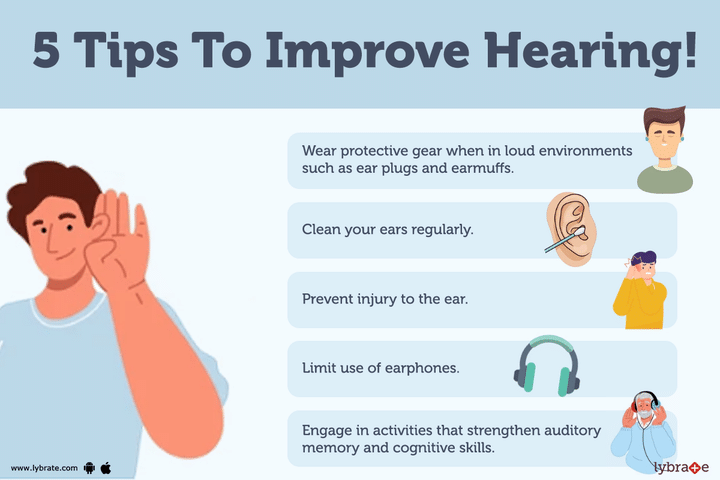Get the App
For Doctors
Login/Sign-up
Last Updated: Mar 21, 2023
BookMark
Report
14 Tips to Improve Hearing and Prevent Hearing Loss
What is Hearing Loss?
Hearing loss refers to a diminished or eliminated capacity to pick up on audible sounds. Its severity can range from minor to severe, depending on the underlying reason, which may be a hereditary predisposition, an ear infection, prolonged exposure to loud noises, a head injury, becoming older, or even a side effect of a medicine.
What are the signs and symptoms of Hearing Loss?
Signs and symptoms of hearing loss can include:
- Difficulty hearing in noisy places
- Asking people to repeat themselves
- Trouble understanding conversations
- Difficulty hearing high-pitched sounds
- Ringing or buzzing in the ears (tinnitus)
- Turning up the volume on the TV or radio
- Avoiding conversations with friends or family
- Feeling isolated from social activities
What are possible complications of Hearing Loss?
- Mental health complications: Hearing loss can result in feelings of frustration and isolation from friends, family, and the world as a whole. It can also lead to anxiety, depression and increased stress levels due to struggling with causes or effects of hearing loss.
- Quality of life complications: One’s quality of life is reduced with hearing loss due to loss of sound perception which affects ability to participate in activities involving music and social conversations.
- Cognitive decline: Hearing loss can cause difficulty in processing information due to the lack of sound input which can lead to cognitive decline and has even been linked to a higher risk for developing dementia later on in life.
- Social implications: Difficulty communicating with others may lead to social isolation as well as feelings of loneliness and alienation from society as a whole; also a decreased sense of safety when out in public is common among those who suffer from hearing loss.
14 Tips to Improve Hearing and Prevent Hearing Loss
- Get your hearing tested regularly.
- Wear protective gear when in loud environments such as ear plugs and earmuffs.
- Avoid exposing yourself to high volumes by listening to music through headphones rather than speakers at a low volume level and using noise cancelling headphones when possible.
- Turn down the volume on your television and radio, making sure it does not exceed a level where you have to raise your voice to be heard over the sound of it.
- Engage in activities that strengthen auditory memory and cognitive skills, allowing for greater processing of sound information for children who may experience learning difficulties due to hearing loss or deafness: puzzle games, jigsaw puzzles, computer games, etc.).
- Get regular checkups with an audiologist or ENT specialist; specifically pay attention to any potential signs of wax buildup in the ears as this can lead to hearing problems if not cleared regularly enough!
- Follow proper hygiene habits such as washing your hands frequently and avoiding touching your face and ears with unclean hands/objects which can spread bacteria leading to infections or other health problems/illnesses which may result in hearing loss).
- Prevent illnesses or injury which can be damaging (or lead) to the ear such as meningitis or head injuries by being extra cautious when playing sports, exercising outdoors in cold weather (with risk of snowballs/ice skating accidents), riding bikes without appropriate safety gear etc.
- Eat nutritious foods & vitamins containing omega-3s while avoiding items rich in salt that contribute to greater levels of fluid accumulation near the ear; increased fluid typically results in decreased sound conduction which often leads towards hearing loss!
- Avoid smoking & second-hand smoke - both are linked with earlier onset age-related hearing loss and higher levels of associated damage during life span years than non-smokers would experience
- Wear protective ear wear when exposed to loud noise, such as concerts, power tools and firearms
- Maintain a healthy lifestyle - exercise regularly, eat a balanced diet and get enough sleep
- Practice good ear hygiene. Wipe the external ear with a clean and soft cloth daily, or keep your ear free from dirt and wax by using a bulb syringe to flush out the outer canal.
- Exercise regularly, particularly activities that get your heart rate up for at least 30 minutes per day as physical activity helps to improve circulation in the body which is beneficial for hearing health.
- Make sure to get enough vitamin B12 in your diet by eating more dairy products, leafy green vegetables, eggs and fish – all of which can help prevent hearing loss associated with an inadequate intake of this important nutrient.
- Quit smoking - exposure to second-hand smoke can cause hearing loss over time and smoking has been linked to an increased risk of temporary hearing loss due to its effects on blood flow and oxygen delivery throughout the body.
- Take ghee every morning in half teaspoon doses (or add it into your breakfast smoothie). Ghee improves circulation so more oxygenated blood reaches your ears and reduces inflammation which could be contributing to some extent of hearing loss
- Drink plenty of fluids – dehydration affects fluid levels within the inner ear structures and leads to a reduction in sound transmission which can contribute towards some types of hearing damage over time so make sure you’re drinking enough water each day
- Ayurvedic herbs like shatavari, brahmi, ashwagandha and licorice can be taken orally to improve hearing.
- A paste made of sesame oil and the herb bhringaraj can be applied around the ears to promote better hearing.
- Warm mustard oil with a few drops of garlic juice can be used as ear drops to reduce inflammation in the ears.
- Herbal decoctions made from fenugreek, yarrow, and chamomile can be taken to improve hearing ability.
What are the surgical treatments for Hearing Loss?
- Tympanoplasty: a procedure which reconstructs and repairs the eardrum and the bones of hearing, leading to improvement in hearing ability.
- Cochlear Implants: a medical device implanted in the inner ear that can help people with severe to profound sensorineural hearing loss to improve their hearing abilities.
- Ossicular Chain Reconstruction: a surgical procedure which reconstructs and restores movement of the three bones in the middle ear (the stapes, incus, and malleus). This helps to transmit sound waves effectively through the ear canal to auditory nerve cells located in the inner ear, improving hearing ability.
- Stapedectomy or Stapedotomy: a procedure that replaces or repairs parts of the stapes bone in order to reduce hearing loss caused by anatomical defects or otosclerosis (hardening of small bones) inside of your middle ear. This can help improve conductive hearing loss due to those conditions before they become permanent.
- Labyrinthitis Surgery: a surgical approach that helps reduce symptoms associated with balance disorder often caused by inner-ear infections or head traumas by drilling away damaged bone around affected fluids susceptible areas like endolymphatic sac/ducts and vestibule area as well as repairing any underlying damage like vestibular schwannoma tumours located at posterior fossa area etc
Best doctors to consult for Hearing Loss?
The best doctors to consult for hearing loss depend on the severity of the condition and the type of treatment needed.
- Audiologists: Audiologists are health care professionals who diagnose and treat hearing loss and balance disorders in individuals of all ages. They provide a range of services including hearing tests, hearing aid fitting and adjustment, counseling on coping with hearing loss, and tinnitus management. Audiologists also specialize in helping children with speech and language disorders related to hearing loss or balance problems.
- ENT specialist: An ENT specialist is a doctor with advanced training in the care of the head and neck region and can help diagnose and provide medical and/or surgical treatment for conditions related to the ear such as infections, hearing loss, tinnitus and dizziness.
In case you have a concern or query you can always consult a specialist & get answers to your questions!



+1.svg)
